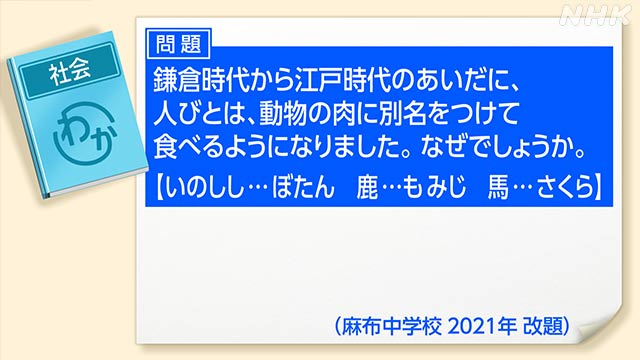"Argon" common people's smart countermeasures October 20, 13:16
Autumn is the season when the leaves are colored and the season is fruitful.
Another fall is the fall of appetite!
This time, it is a question about food that feels the wisdom of our predecessors.
Challenge the problem!
Problem Between the
Kamakura period and the Edo period, people began to eat animal meat with another name.
Why.
[Wild boar ... Peony deer ... Maple horse ... Sakura]
(Azabu Junior High School 2021 renamed)
For example, the wild boar is "kale".
The deer is "Maple".
Horses are sometimes called "Sakura", aren't they?
The correct answer is, "Because Buddhism prohibited eating meat, we gave it a plant name to make it easier to distribute."
In other words, "bottan," "maple," and "sakura" were "code words" that only people who understand them could understand.
So why was such a "secret word" born?
The wisdom and warmth of the common people were hidden there.
The reason why the "secret word" of meat was born
We asked Masakazu Toki, an emeritus professor at Edogawa University, who is familiar with Japanese culture from the Middle Ages to the present.
The jargon is said to have been created by the common people as a countermeasure against Buddhism, which banned carnivorous food, and the politicians of the time.
Toki-san
"Japanese people were told from above that they shouldn't eat meat. Especially in the Edo period, the regulations are very strict because it is a feudal society. teeth"
This is a picture from the end of the Edo period.
Certainly, the meat pot is drawn in the middle.
Toki-san:
"I'm not very good at the world, but I started eating meat. At that time, I said," I'm eating medicine. " I was sick when I said, "This is really a boar." So I gave it a different name, and it was a big eye-opener. "
What is the origin of the jargon?
There are various theories
From here, the jargon words "peony," "maple," and "sakura," which were used in the entrance examination questions, are derived.
First of all, from the wild boar meat "peony".
Toki-san
"This is the theory that when cut and lined up, it looks like a peony. Another thing is that the peony is"
Karajishibotan.
" However, it was drawn by combining it with a picture of a lion. The lion was originally a lion, but since it is not in Japan, it has changed to a peony. There is a theory that
What is the origin of venison, "Maple"?
Toki-san
"One is Hyakunin Isshu. There is a famous song in this song," When the deer's voice is
heard in
Okuyama, autumn is sad. " That is drawn in the picture. Especially famous for the common people is the flower tag. The 10-point tag is "Maple deer". Since it has been a familiar play for the common people for a long time, "Deer is more and more" It has taken root. "
And horse meat, "Sakura".
In addition to saying, "Because it turns cherry-colored when boiled," there seems to be such a theory.
Toki-san
"There is a song called" Yamake
Torimushika
"in a folk song that has been famous since the Genroku era. There is a lyrics in it," Why if the pieces that connect the pieces to the blooming cherry blossoms brave, the flowers will fall. " A clumsy horse connects a horse to a cherry blossom in full bloom. Then, the horse goes wild and the cherry blossoms scatter. There is also a theory that it was attached. It seems to be very Japanese. "
The jargon that "evolved" from "squid" to "octopus"
Even if it is prohibited, I enjoy it by reasoning that "because the name is different".
The warmth of the common people was manifested in addition to food.
Toki-san
"The most famous one is" Tako ". It is" Tako "that is fried in the sky. It originated in China and was introduced to Japan during the Heian period. However, at that time, it was in the shape of a bird. In the Muromachi period, "feet" were attached. Then, it became similar to the shape of "squid". That's why I came to say "squid climbing". In the Edo period, adults also enjoyed it a lot. I was enthusiastic. However, various problems arose. "
I was so absorbed in it that many accidents occurred with "squid climbing".
It seems that he once fell into the Daimyō procession.
It seems that the Edo Shogunate issued a "squid climbing ban" in 1646 ...
Toki-san
"All the common people want to play. I'll hide. But it's not good to be caught. What's wrong? Some people said that this was not a" squid "but an" octopus. " Then, gradually, what was originally "squid" has become "octopus". It is exactly "if there is a policy above, there is a countermeasure below." In the background, I have created hidden words using Japanese cultures such as octopus, Buddhism, and folk songs that have been connected for a long time. This is very interesting. I think it is a Japanese ingenuity. "
Why are jargon such as "botan" and "sakura" used even in modern times when meat is not banned?
According to Mr. Toki, it is not a simple alias, but because it is linked to traditional Japanese culture, there is a "twist" that people today feel that they are swanky and swanky. That's right.
The jargon will survive beyond the times if there is depth.
In "Migake, Curiosity!" Of "Weekly Maru-Knowledge News" (broadcast at 9:00 am on Saturday), we will delve into the news every week on the subject of current affairs presented in the entrance examination.
Let's think of "why?", In fact, "in the first place" that you want to know as a Kamakura caster!
You can also review the past on the corner homepage.
Please take a look from the link below!
https://www3.nhk.or.jp/news/special/maruwaka-migake/

